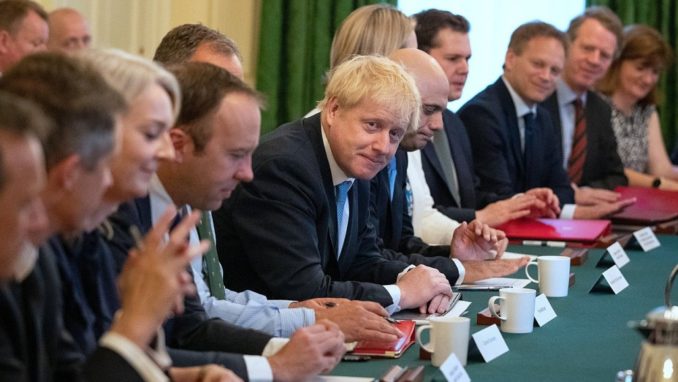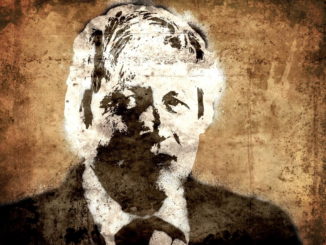
UK Prime Minister, OGL 3, via Wikimedia Commons
A paradox is an apparent absurdity or contradiction that, on close investigation, is found to be true. What’s happening in government right now is hardly paradoxical – it certainly appears to be both absurd and contradictory, but on investigation is found to be just that: absurd and contradictory!
Whether you are thinking of the Chancellor, the governor of the Bank of England or the Prime Minister himself, Macbeth provides an apt assessment of the goons purporting to be running (ruining?) this country. Each of them
“struts and frets his hour upon the stage,
And then is heard no more. It is a tale
Told by an idiot, full of sound and fury,Signifying nothing.“
Not just “an” idiot – all of them, including a weak, ineffective, self-obsessed and rudderless cabinet thinking only of the next election.
Speaking of absurdity and contradiction, try this: over five million people are now claiming unemployment benefits, yet many of them don’t count as unemployed. Why? Because they are not looking for jobs. Yet we are now experiencing unprecedented labour shortages despite sky-high pay-offers. What happened to their natural incentive to look for a job? We’ll come to that – but it’s a state of affairs that’s patently contradictory and absurd, no?
There are natural laws in economics
People face a tsunami of rising prices, yet who in authority understands the basic laws that determine the price level? It must be obvious, even to a politician, that – in the absence of government intervention – the price level is determined by the relationship between the supply of goods and services and the demand for goods and services, as evidenced by actual spending.
This much is obvious: high prices discourage spending, and low prices induce spending. And it’s the reverse with supply: an increase in the availability of goods and services will cause their prices to fall, and if supply is cut off or disrupted, prices will go up, discouraging spending.
But note the above caveat “in the absence of government intervention” or, as it’s usually expressed: “all other things being equal.” That’s the problem: I referred to demand and supply but deliberately made no mention of the medium of exchange that facilitates resulting transactions: money.
Manipulation of the money supply
All other things are not “equal” if government manipulates the money supply. In the days of a gold exchange standard, notes issued bore a fixed relationship with a defined weight of gold – which meant in effect that a nation’s gold reserves set a limit to its money-creating actions, no matter how critical those actions might be; and its currency units were fully backed by, and effectively convertible into gold. This was the polar opposite of a system under which the government is endowed with that elixir of supreme political power: a licence to print money out of thin air without restraint, facilitating favouritism, vote-catching, profligate public spending gestures, uncosted “good ideas”, untold waste – and embedded corruption.
The folly that these officials swallow is the Keynesian dictum that production can be energised by stimulating demand, effectively justifying money-printing. (No wonder he is universally worshipped by governments and their academic acolytes!) Yet this illogical travesty reverses Say’s Law governing the sequence of demand and supply in a free market. The truth is that adding more money simply causes prices to rise, and induces a toxic wealth transfer that favours the early receivers nearest to the money trough, while impoverishing the poorest forced to face the higher prices.
There’s money on tap
It also instils in the public’s mind the pernicious theory known as MMT (modern monetary theory) that money is always available when there’s a problem, and can be spent without consequence. Chancellor Sunak has just lashed out a £9 billion package to help with energy bills, but it’s soon forgotten – only to be followed by a call for an even bigger splurge.
To be fighting a cost-of-living crisis caused by rocketing inflation with yet more inflationary stimulus is nothing short of insane, yet this is what is being called for, almost universally. It’s the recipe for a perfect storm. After increasing demand by massively inflating the money supply for a decade of quantitative easing, the government now faces severe supply disruptions caused by war, lockdowns, raised employment taxes, disincentives to work and their consequent impact on production.
Reversion to the culture of entitlement
Government now presides over the handout culture of entitlement and dependency into which all bankrupt socialist regimes sooner or later, but unfailingly, descend. Yet only last month the PM declared that (i) his spending pledges would be met by cutting taxes; and (ii) lower tax rates can raise higher revenues. That makes sense, of course – but then what happened to it?
In Sunak’s recent budget statement he positioned himself to the “Left of Labour” on big government, after which Labour’s Shadow Chancellor crowed that the Labour Party is doubtlessly winning the battle of ideas. Sunak responded to the Labour challenge by boasting: “Our proposals are in fact more generous than those offered by the Labour Party”.
It’s scarcely believable. The UK now has a state-managed economy in the mould of core socialist tradition, plus a large measure of contemptible incompetence.
Central banking lemmings
The US Fed, of course, is the central bankers’ role model. Its latest strategy to combat inflation is to raise taxes on employers and the “rich” to reduce the federal deficit and to subsidise housing and prescription drugs among their vote-winning targets. Under President Biden the USA’s economy has become a wealth-redistribution system with no thought of real growth. It will, in effect, attempt to solve the problems it caused when it flooded the economy with billions of dollars by, you guessed it, pumping in still more dollars, in the process penalising the very companies that provide employment and therefore support the households that are suffering the worst price hikes.
These lemmings, only months ago, downplayed inflation as a transitory phenomenon that was under control and would, by the autumn, revert to its 2 per cent target rate. In panic they then blamed “supply chain” disruption caused by the pandemic and the Ukraine war. In the EU interest rates set by the ECB are still in negative territory and money-printing has barely stalled, while member states are funnelling still more cash into their economies “to help fight inflation” – yet inflation still soars by between 9pc in Germany and 20pc in Estonia.
Even a lemming knows that inflation can’t be curbed by lashing out still more “emergency” welfare cheques. This is a political fight that has little to do with economics. It is rather focused on Governments’ own self-preservation instincts.
The essence of Capitalism
Career politicians in the conservative ranks now fail to understand the rudiments of free-market capitalism. Unlike socialism, it isn’t a system, or school of thought imposed from above, but emerges, evolves and grows spontaneously. Brexit was hailed as an opportunity to get rid of destructive protectionism. But instead of liberating international exchange by declaring unilateral free trade we have barely moved in six years: free cross-border trade between businesses remains a distant dream.
As Chancellor, Sunak should know that new taxes, however clothed, always damage growth, are always borne by people, not faceless corporations. Yet recent tax increases have led to higher energy costs and hence higher welfare costs. Speaking of absurdity and contradiction, we see “net zero” targeting coinciding with fuel poverty; we see farming cohorts lobbying for import tariffs (“lest we are flooded with cheap food”!) coinciding with food poverty. We have an ingrained belief in a welfare system that includes a minimum wage set at a higher level than almost anywhere else in Europe, plus Cameron’s flagship reform, “universal credit”, introduced with strings of conditionality, abandoned during lockdown and never restored, trapping people in welfare. People are being paid not to work – even after a lockdown that crippled productive industry and institutionalised dependency on the state.
This is the farce we are stuck with until someone joins the dots. Boris Johnson is facing the furnace of his afflictions and we don’t know how long he will survive – but what an opportunity for a successor with a principled sense of direction. Someone who knows that “people will not long trust leaders who feel themselves beyond accountability for what they do.” [Wall Street Journal, Editorial, 14 May 1952]
© Emile Woolf June 2022 (website)



